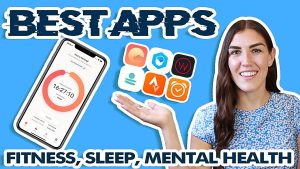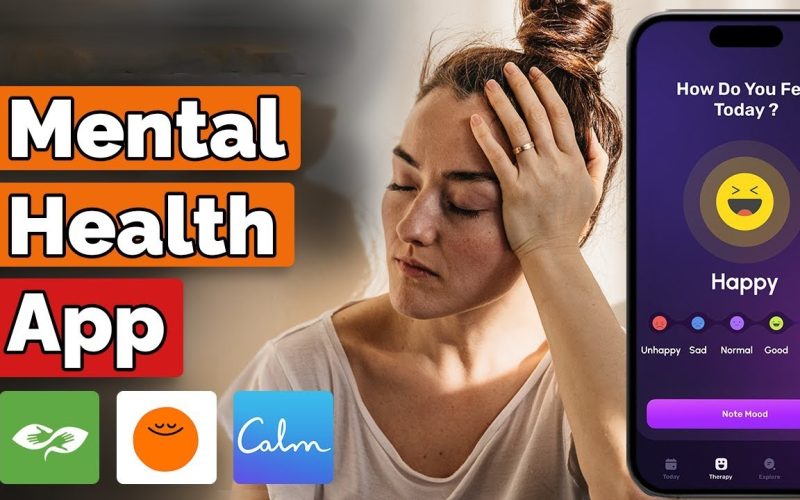Introduction
In recent years, mental health apps have grown in popularity, offering an accessible and convenient way for individuals to take care of their emotional well-being. These apps provide tools for managing stress, improving mood, and even connecting users with professional therapists. As we enter 2025, the demand for digital wellness tools is higher than ever, with more people seeking innovative ways to address their mental health needs.
This article will explore the popular mental health apps making waves in 2025, their benefits, and how they can help individuals improve their overall well-being. We will also highlight some key features to look for when choosing the right app for your mental health journey.
What Are Mental Health Apps?

Mental health apps are mobile applications designed to support individuals in managing their mental health. These apps provide a variety of services, from guided meditation to mood tracking and professional counseling. Many mental health apps also offer features like sleep improvement techniques, self-care routines, and stress management exercises.
The primary goal of these apps is to make mental wellness more accessible to everyone. They help users deal with issues like anxiety, depression, and stress while providing a discreet and convenient solution for maintaining good mental health.
Popular Mental Health Apps Gaining Traction in 2025

As more people embrace digital health tools, several mental health apps have gained traction in 2025. These apps offer a range of features designed to promote mental wellness, including therapy sessions, meditation guides, and mood tracking. Below are some of the top mental health apps that are gaining popularity:
1. Calm
Calm is one of the most popular mindfulness apps available today. It is designed to help users reduce stress, improve sleep, and practice mindfulness through guided meditation sessions. Calm offers a variety of features, such as relaxing music, sleep stories, breathing exercises, and daily meditations. Its simplicity and effectiveness have made it a favorite among users looking for quick ways to relax and de-stress.
The app also provides personalized recommendations based on your preferences and mood, making it an ideal choice for those who are new to meditation or looking to deepen their practice.
2. Headspace
Headspace is another leading mindfulness app that helps users manage their mental health. It offers a wide range of guided meditation sessions aimed at improving focus, reducing stress, and promoting overall emotional well-being. One of Headspace’s standout features is its ability to create a personalized meditation journey based on your goals and needs.
3. BetterHelp
This app has made professional counseling more accessible by offering affordable therapy options from the comfort of your home. In 2025, BetterHelp continues to grow in popularity as it offers flexible therapy sessions for individuals, couples, and even teens.
Users can choose a therapist based on their preferences and needs, making it a great option for those who prefer personalized, one-on-one therapy. With its affordability and accessibility, BetterHelp is one of the top choices for people seeking professional mental health support.
4. Moodfit
Moodfit is a comprehensive mental wellness app designed to help users track their mood and emotional health over time. The app includes mood tracking features, guided exercises, and personalized tools for improving mental well-being. Moodfit is unique because it allows users to log other factors that affect mood, such as exercise, sleep, and stress levels. By doing so, the app provides a more holistic view of your mental health and helps identify patterns over time.
5. Talkspace
Talkspace is another therapy app that connects users with licensed professionals through online counseling. It offers a variety of therapy options, including individual therapy, couples counseling, and even therapy for teenagers. Talkspace is highly accessible and provides users with the convenience of virtual therapy sessions via text, video, or voice.
Benefits of Using Mental Health Apps

The rise of mental health apps in 2025 brings several benefits to users looking for convenient and accessible ways to improve their emotional well-being. Here are some of the key benefits:
1. Accessibility and Convenience
One of the biggest advantages of mental health apps is their accessibility. This makes it easier for people to fit mental health care into their busy schedules.
Additionally, many apps offer features that allow users to access self-help resources or therapy sessions without needing to leave their homes. This is especially valuable for individuals who may feel uncomfortable seeking help in person or who have limited access to mental health services.
2. Affordable Support
Traditional therapy can be expensive, but mental health apps offer affordable options for mental health care. Many apps have free versions or low-cost subscriptions, making it possible for more people to access valuable resources.
3. Personalized Care
Many mental health apps use AI and machine learning to provide personalized care. For example, mood-tracking apps like Moodfit use your data to give tailored recommendations for improving your mental health.
4. Stress Relief and Mindfulness
Mindfulness and stress relief are at the core of many popular mental health apps like Calm and Headspace. These apps help users reduce anxiety, improve focus, and achieve relaxation through meditation, deep breathing exercises, and guided visualizations.
5. Improved Mental Wellness
By offering tools to manage stress, track mood, and practice mindfulness, mental health apps can lead to long-term improvements in mental wellness. Regular use of these apps helps users develop healthier habits, become more self-aware, and learn coping strategies to manage difficult emotions.
Tips for Getting the Most Out of Mental Health Apps

To fully benefit from mental health apps, here are some simple tips:
- Set a Routine: Use your app consistently to establish a routine. For example, meditate every morning using Headspace or log your mood at the end of each day using Moodfit.
- Track Progress: Monitor your progress over time. Many apps provide insights into how your mood has changed and offer personalized recommendations.
- Combine with Other Methods: Consider using a mental health app in combination with other self-care practices such as exercise, journaling, or talking to a friend.
- Choose the Right App: Pick an app that fits your personal needs. Whether you’re looking for mindfulness, therapy, or mood tracking, make sure the app you choose offers features that work for you.
Conclusion
Mental health apps are gaining significant traction in 2025, providing individuals with accessible, affordable, and personalized solutions for improving their emotional well-being. Whether through mindfulness exercises, mood tracking, or virtual therapy, these apps are making it easier to take care of mental health on a daily basis. With so many apps to choose from, it’s important to find the right one for your specific needs.











